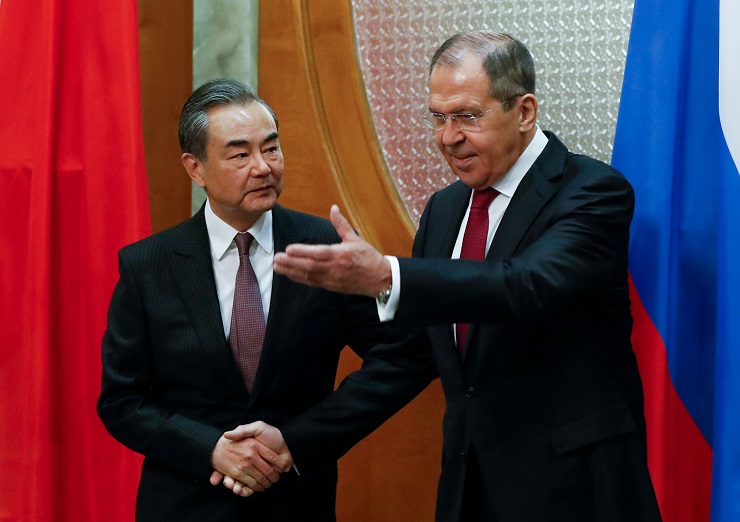Whereas the recently held QUAD summit and the following foreign visits of the US Defense and State secretaries to Asia & the Pacific have clearly set in motion the Biden administration’s “China Strategy”, the probable coming together of the anti-China forces has already led China to consolidate its own position by seeking to deepen its ties with Russia in a way that can challenge some hegemonic ambitions the US is trying to realise through the QUAD. Russia’s embrace of China is a major development that has the potential to absolutely outweigh any potential benefits the Biden administration has calculated to gain through a revitalization of the QUAD. There is a clear understanding in both Russia and China that the Biden administration’s ambition to bring America back to the centre of global politics can be realised only through a concerted US campaign against them, a move that relies heavily on a US political, economic and military presence in Asia & the Pacific. The QUAD summit has signalled that unequivocally.
Accordingly, in a recent press conference, Chinese State Councillor and Foreign Minister Wang Yi underlined the coming of age of the Russia-China strategic partnership. To quote him,
“China and Russia standing together will remain a pillar of world peace and stability. The more unstable the world is, the greater the need for carrying forward China-Russia cooperation. China and Russia should be each other’s strategic support, development opportunity, and global partner. This is both an experience gained from history and an imperative under the current circumstances.”
Underscoring the fact Russia and China will support each other and jointly face the destabilising attempts, Wang said,
“We will set an example of strategic mutual trust, by firmly supporting each other in upholding core and major interests, jointly opposing “color revolution” and countering disinformation, and safeguarding national sovereignty and political security.”
While Russia and China have yet not developed a direct military alliance, such a possibility cannot be ruled out. In fact, Russia’s Vladimir Putin, who was recently subjected to a US verbal attack, recently said that a military alliance is not all together an impossibility.
The idea of a Russia-China military alliance gained traction recently when Alexey Maslov, Director of the Institute of the Far East at the Russian Academy of Sciences, cautioned that the Biden administration was really going to up the ante against China and that a military alliance, although it would have many challenges, could become the need of the hour.
In other words, whereas it is the very US policies that are forcing China and Russia to close their ranks and embrace each other tightly, it equally continues to dread such prospects. And the reason is simple: this alliance has a global outreach and can challenge the US anywhere in the world. Therefore, the US has been trying to simultaneously confront Russia and China. As Maslov noted,
“The US is trying to surround Russia and China with groups of conflicts. It is trying to impose a new global control system through conflict management. And so far, Russia and China are in the position of defending or justifying themselves. In my opinion, a joint Russian-Chinese concept is a very important step to stabilise the world right now.”
Whereas the ideal course of action for the Biden administration would have been to normalise relations with China and end the “trade war” and start a real strategic dialogue, the start of this dialogue in Alaska has already been completely overshadowed by the twin events: the QUAD summit and the approach adopted by Biden’s Defense Secretary before his departure on a maiden visit to Asia & the Pacific. Plus, the US Secretary of State has refused to call it even “strategic.”
As such, whereas the US has imposed fresh sanctions on Russia, China and the US are edging towards a new period of war through a concerted US effort to build a chain of anti-China countries surrounding China in Asia & the Pacific. As Maslov, too, correctly noted, the Biden Administration will step up pressure on China “in several main areas” and is hell bent on preventing it from entering the high-tech sphere, especially with European partners, and implementing the “Made in China 2025” strategy. American steps, therefore, continue to pose serious obstacles.
Therefore, while a global context for a Russia-China embrace does exist, such a development eventuality will have major implications not only for both Russia and China, but also for countries in the region, especially those seeking to build an “Asian NATO” under the US auspices.
This is especially true of India, which is not only a major US partner in the QUAD, but also relies heavily on Russia for about 49 per cent of its defense purchases. A Russia-China militray alliance would put India in a quandary, forcing it to recalibrate its overtly anti-China position in the QUAD to maintain balanced ties with Russia, China’s major ally, and avoid an unnecessary confrontation or a potential discrepancy in its defense supplies. India’s attempt to maintain a ‘balance’ between the QUAD and Russia-China alliance would inevitably disrupt the “Asian NATO” from within, taking its potential to pose any serious challenge to China.
In other words, not only would a mature Russia-China alliance be much better positioned to face the US challenge at global level, it would be equally effective in Asia, where a number of countries have relations, both with Russia and China, deep enough to undercut US attempts to build new militray alliances.
Salman Rafi Sheikh, research-analyst of International Relations and Pakistan’s foreign and domestic affairs, exclusively for the online magazine “New Eastern Outlook”.

